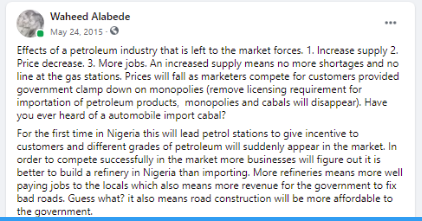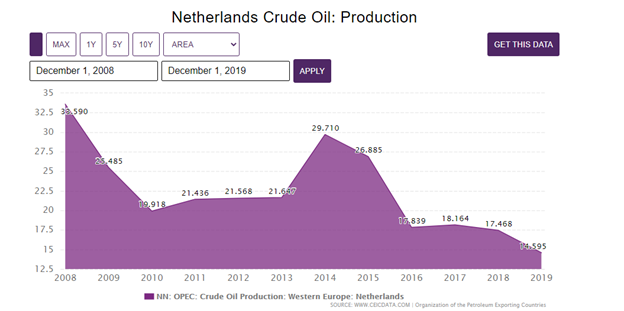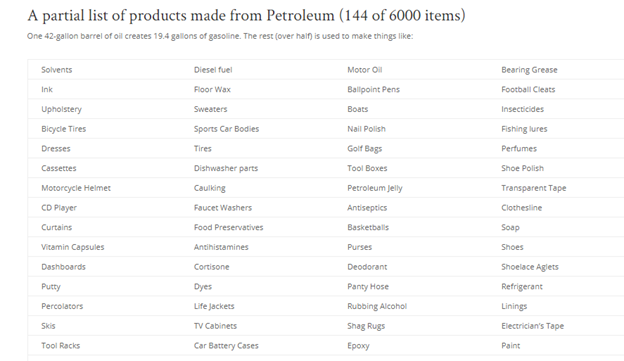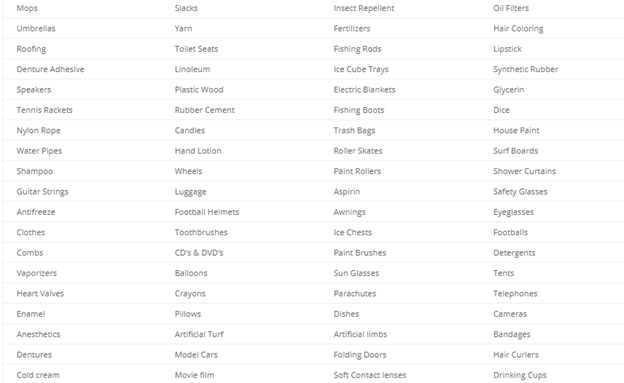FUEL SUBSIDY REMOVAL - WHAT TOOK YOU SO LONG?
Dear Nigerians,
The subsidy removal is like an effective medicine that taste awful at the beginning of the treatment. It will get better and it will create JOBS.
THREAD of an Unpopular Opinion
Dear Nigerians,
The subsidy removal is like an effective medicine that taste awful at the beginning of the treatment. It will get better and it will create JOBS.
THREAD of an Unpopular Opinion
Can we eat our cake and have it? Subsidize PMS while building infrastructure, funding education and at the same time creating good jobs?
I will start with what we know about our subsidiy regime.
I will start with what we know about our subsidiy regime.
According to the attached report, Nigerians consume 38.2 million litres of PMS daily. This, based on the old 145/ltr price, means if subsidy or under recovery is still in effect, the govnt would have been paying ₦6.56 per litre every time you fill up. https://www.thisdaylive.com/index.php/2020/06/02/petroleum-ministry-dpr-differ-on-nigerias-daily-fuel-consumption/">https://www.thisdaylive.com/index.php...
So, expenditure on subsidy would have amounted to about ₦250M/ day or over ₦90B annually.
We know crude oil prices will change hence the need to review the past to gauge what subsidy may cost us annually.
We know crude oil prices will change hence the need to review the past to gauge what subsidy may cost us annually.
In 2019, subsidy amounted to ₦1.149 trillion in the same year that the national budget was 8.83Trillion (13% of budget).
What about in 2018?
What about in 2018?
In 2018, the subsidy cost us over ₦700B while in the same year, we spent less than ₦50B on education capital expenditure. Nigerians prioritize cheap PMS over the quality of education of our children. Most elites can afford private school, who suffer? https://www.premiumtimesng.com/news/top-news/385394-nigeria-spent-n722-3-billion-on-fuel-subsidy-in-2018-neiti-report.html">https://www.premiumtimesng.com/news/top-...
Again, in a yr that we allocated only 6.7% of our national budget to education, we spent a higher % on subsidy. If this is not misplaced priority, I do not know what is. The subsidy is hurting the future of poor people& #39;s children more than the removal https://educeleb.com/education-ministry-nigerias-2019-budget/">https://educeleb.com/education...
The price increases will eventually lead to a reduction relative to crude oil prices in the future. With more players in the market, the price will eventually start falling.
I am not saying that PMS prices will never increase with increases in crude oil prices, NO! Far from it. I am simply saying if we had left the industry to market forces years back, we would have been paying less than 156/litre today.
Example - The savings from the unncessary cost of shipment of crude to other countries for refining and cost of shipment of refined petroleum back into the country, the higher cost of labour in those countries etc would have reflected in our pump price. But how?
To compete successfully in the deregulated market more businesses will figure out it is better to build a refinery in Nigeria than importing. More refineries mean more well-paying jobs to the locals which also means more revenue for the government to fix bad roads. Guess what?
There are many benefits that comes from the removal of subsidy. I will not go into details on them but see below my comment on Facebook in 2015. I will move straight to job creation
This is what I wrote in 2015 on Facebook -
This is what I wrote in 2015 on Facebook -
According to the 2020 Q2 workforce data recently released by the NBS, people of working age (between 16-64) are about 115.5 million out of which the NBS reported 80.3 million were actively in the job market. Of the 80.3M, about 21.8M did not work up to 20 hours per week.
As if that is not bad enough, of the 21.8M, about 9.4M did not work at all. We want to spend hundreds of billions on subsidy while almost 10M Nigerians did not have any means of livelihood.
Paying our fair share can lead to jobs for some of the millions of unemployed?
Paying our fair share can lead to jobs for some of the millions of unemployed?
Many of the exporting nations have created millions of Jobs from the crude oil and petro chemical industry. Our main refined crude oil trade partner Netherland view the industry as a major wealth and job creator.
Netherlands - 2018, largest exporter of petrochemical to Nigeria with a $ value of over $4B worth, the petrol chemical industry is the top creator of sustainable jobs and wealth.  https://abs.twimg.com/emoji/v2/... draggable="false" alt="🇳🇱" title="Flagge der Niederlande" aria-label="Emoji: Flagge der Niederlande"> produces less than 100,000 B/PD while Nigeria produce over 2 million barrels per day. Go figure.
https://abs.twimg.com/emoji/v2/... draggable="false" alt="🇳🇱" title="Flagge der Niederlande" aria-label="Emoji: Flagge der Niederlande"> produces less than 100,000 B/PD while Nigeria produce over 2 million barrels per day. Go figure.
Netherland that produces far less crude oil still export more than double all Nigeria& #39;s export in processed crude and chemical alone.  https://abs.twimg.com/emoji/v2/... draggable="false" alt="🇳🇱" title="Flagge der Niederlande" aria-label="Emoji: Flagge der Niederlande"> export of processed fuel and chemicals alone was about $140B while
https://abs.twimg.com/emoji/v2/... draggable="false" alt="🇳🇱" title="Flagge der Niederlande" aria-label="Emoji: Flagge der Niederlande"> export of processed fuel and chemicals alone was about $140B while  https://abs.twimg.com/emoji/v2/... draggable="false" alt="🇳🇬" title="Flagge von Nigeria" aria-label="Emoji: Flagge von Nigeria"> total export of all products was less than $70B.
https://abs.twimg.com/emoji/v2/... draggable="false" alt="🇳🇬" title="Flagge von Nigeria" aria-label="Emoji: Flagge von Nigeria"> total export of all products was less than $70B.
https://wits.worldbank.org/CountryProfile/en/Country/NGA/Year/2018/TradeFlow/EXPIMP/Partner/WLD/Product/all-groups">https://wits.worldbank.org/CountryPr...
https://wits.worldbank.org/CountryProfile/en/Country/NGA/Year/2018/TradeFlow/EXPIMP/Partner/WLD/Product/all-groups">https://wits.worldbank.org/CountryPr...
So why is Crude oil processing such a job creator? Look no further than the products and byproducts of crude oil. The refinery and its supply chain are a huge job and wealth creator. Remember, crude oil is beyond just petroleum.
The process of turning crude oil to other products create jobs and there are 10’s if not hundreds of thousands of jobs to be created in the processing. The job creation extends to the industries that converts available and affordable feedstock to produce other final goods.
Some of the products from are – Transportation fuel, heating and cooking oil, electricity generation oil and gas, raw material for the manufacturing of plastics, synthetic raw material used for making many products including synthetic fiber, and chemicals used in paints.
See the lists of some of the thousands of products that can be made from or contain products or byproduct of processed crude oil. All these will be almost impossible with subsidy because refineries can not quicly react to changes in crude oil (input) prices.
If you think the only jobs that will be created with the building of more refineries are petroleum industry jobs, you need to get up wherever you are right now and start looking around. YOU ARE SURROUNDED BY products made with more or few inputs from the industry. JOBS JOBS JOBS
We are drinking our jobs with the subsidy straw.
My opinion will remain meaningless if our office holders, appointees and some of our civil servant don& #39;t show real progress in curbing excessive spending.
My hope is that as we move forward, Nigerians will care more about corruption & less about religious and tribal sentiments
My hope is that as we move forward, Nigerians will care more about corruption & less about religious and tribal sentiments
Like the Kaya wo/man that eats food s/he can& #39;t afford, we have been eating the skin on our head. Alaru ton je buredi ni gbogbo wa.

 Read on Twitter
Read on Twitter

 produces less than 100,000 B/PD while Nigeria produce over 2 million barrels per day. Go figure." title="Netherlands - 2018, largest exporter of petrochemical to Nigeria with a $ value of over $4B worth, the petrol chemical industry is the top creator of sustainable jobs and wealth. https://abs.twimg.com/emoji/v2/... draggable="false" alt="🇳🇱" title="Flagge der Niederlande" aria-label="Emoji: Flagge der Niederlande"> produces less than 100,000 B/PD while Nigeria produce over 2 million barrels per day. Go figure." class="img-responsive" style="max-width:100%;"/>
produces less than 100,000 B/PD while Nigeria produce over 2 million barrels per day. Go figure." title="Netherlands - 2018, largest exporter of petrochemical to Nigeria with a $ value of over $4B worth, the petrol chemical industry is the top creator of sustainable jobs and wealth. https://abs.twimg.com/emoji/v2/... draggable="false" alt="🇳🇱" title="Flagge der Niederlande" aria-label="Emoji: Flagge der Niederlande"> produces less than 100,000 B/PD while Nigeria produce over 2 million barrels per day. Go figure." class="img-responsive" style="max-width:100%;"/>





